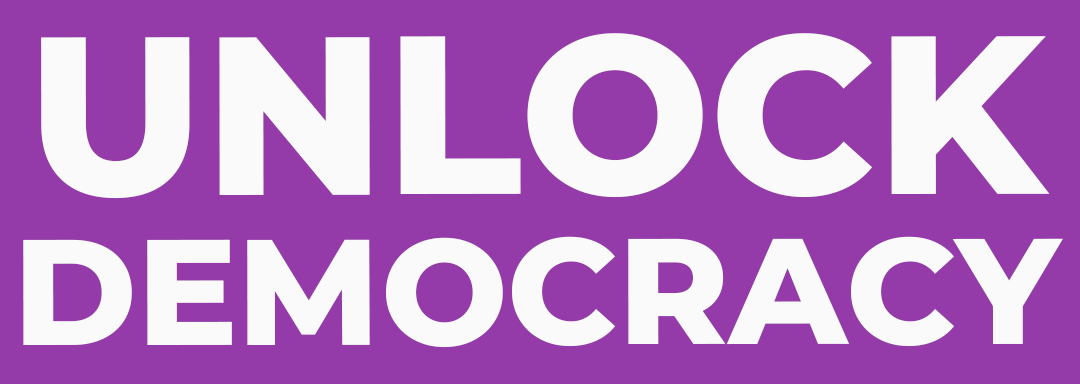UK Democracy Under Strain: Democratic Backsliding and Strengthening 2019 - 2023
A new report commissioned by democratic pressure groups, Unlock Democracy and Compass, and written by Professor Toby James of the University of East Anglia, sounds the alarm about a long-term decline of UK democracy, exposing a systematic decoupling of people and power.
Focusing on the period from 2019, the report identifies a host of new challenges to the UK’s democratic resilience, including the holders of elected office breaching codes of conduct, democratic norms, and sometimes the law, itself.
This is an independent report commissioned by Unlock Democracy and funded by the Joseph Rowntree Reform Trust.
There have been concerns about declining levels of democracy and democratic backsliding around the world. Countries such as the United Kingdom have been called upon to support and address this global problem: one of the most important of our time. But democratic erosion can occur within any country.
The report traces developments in the quality of democracy in the United Kingdom between 2019-2023. It reveals that the UK has itself seen a marked decline in the quality of democracy against five key components of democracy:
● The integrity of elections and freedom of speech have been undermined. The Elections Act 2022 reduces the independence of electoral bodies and introduces photographic voter identification requirements. Media concentration is becoming an increasing problem alongside pressures on local journalism and concerns about government appointments to the BBC. The use of ‘dark money’ in elections is an increasing concern. Freedom of speech remains protected in law, but a proposed Online Safety Bill may restrict this in the future. The government has also made political interventions to shape education syllabuses.
● Constitutional Protections have been put under severe strain following major breaches of the standards in public office at the most senior level and concerns about corruption and conflict of interest. There have been attempts within parliament by a prime minister to change the parliamentary standards system for political purposes. Political rights have been undermined by the Police, Crime, Sentencing and Courts Act 2022 and the Public Order Act 2023 which increase powers to stop protests. Law was experienced unevenly, with Black citizens much more likely to be stopped and searched than White people by the police. Access to legal aid is restricted, making justice uneven. The Government has strengthened its power over the judiciary by reducing the scope of judicial review in the Judicial Review and Courts Act 2022. Government ministers have openly shown willingness to break international law.
● Participatory conditions for democracy have remained good with widespread elections across all levels of government and opportunities for participation in party leadership elections for party members. However, there remains no opportunity for direct or indirect participation regarding the election of the second chamber - with the House of Lords seeing more direct appointments by the Prime Minister. The devolution of power to local councils and people has been promised by consecutive governments and prime ministers since 2010, but there has been very little genuine devolution so far. There is evidence that money has been allocated unevenly to local areas on the basis of ‘pork-barrelling’ rather than through democratic mechanisms, with marginal government-held areas the beneficiaries.
● Deliberative conditions for democracy have been damaged by the fast-tracking of legislation through Parliament by the Government. There are also ongoing concerns about social media disinformation, with false information being spread about the Ukraine war and Covid vaccines. There have been innovative and important examples of citizens’ assemblies, such as the Climate Assembly in Scotland, but citizens’ assemblies remain infrequent and disconnected from policy making.
● Educational and economic resources are needed by all to be active citizens in society. The pandemic saw disparities in education levels grow which may have lasting consequences for democracy. There remains no universal democratic education in schools to inspire and inform the next generation of citizens. There has been a growing ‘cost of living’ crisis and decline in material living standards. The Strikes (Minimum Service Levels) Bill, introduced by the Government in 2023, has been argued to undermine worker and human rights and may negatively affect living standards further.
Charter 88 - Unlock Democracy’s parent organisation - was published in 1988 as a call to action to ‘demand political, civil and human rights in the United Kingdom.’ It was at a time when there was widespread discontent and concern with the quality of UK democracy. Given the developments mapped out in the report, these concerns should be ever-greater today.
The report therefore sets out ten key recommendations to form a new charter to protect, strengthen and renew democracy in the UK.
Toby S. James is Professor of Politics and Public Policy at the University of East Anglia and Distinguished Fellow and Adjunct Professor at Queens University, Canada. He is also the co-Director of the Electoral Integrity Project and the Editor-in-Chief of the multi-disciplinary journal Policy Studies. His research covers areas including democracy, electoral integrity and the policy process. He is the author or co-editor of eight books, published widely in leading journals and has written commissioned policy reports for national and international organisations. www.tobysjames.com
